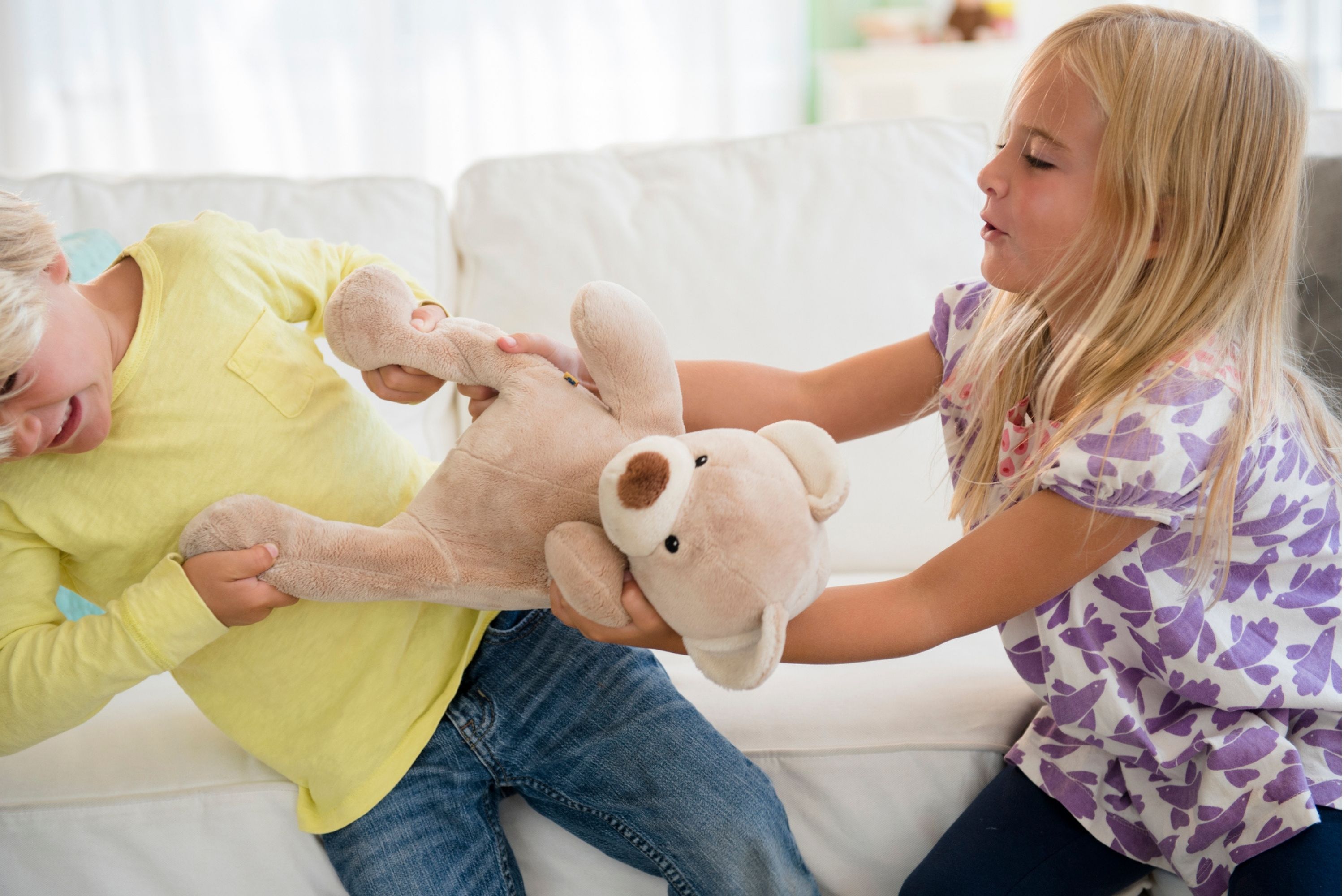Joe Wicks just dropped a parenting truth bomb about sibling rivalry and I feel so seen - but here's why it really happens
Joe Wicks sometimes 'feels like a referee' when it comes to his kids' squabbles - don't we all?


If there's one thing about family life that I wish people were more honest about, it's sibling rivalry. Sweet mercy, the squabbling. It's nonstop.
Thank the heavens for Joe Wicks who has opened up about just how challenging this little-talked-about part of parenthood can be.
Like Joe, I spent the early years of parenthood feeling like a referee thanks to sibling rivalry. And yet everywhere I looked, other parents seemed to be sailing through family life without so much as a cross word between kids, never mind regular bouts of brotherly bloodshed.
“Being patient, understanding and compassionate when they’re fighting, that’s the hardest part for me," said Joe, who has three children and another baby on the way with wife Rosie. In an interview with BBC’s Tiny Happy People, he added: “That’s kind of difficult at times. So, the more I read about parenting and understand my child, the better I can react and interact with them."
I've always been a Joe Wicks fan - PE with Joe quite literally helped to keep me sane during Lockdown. But now that I've heard him admit so openly that it twists his melons when his kids fight, I'm practically a superfan.
Oh, how I wish more parents told the truth about how bad sibling squabbling can get, and what a challenge it is to cope with as a parent. For years I thought I was doing something wrong; that something about me or my parenting style was somehow creating warring little barbarians instead of the dearly devoted brothers I had imagined.
I kept a blog at the time and wrote this:
GoodtoKnow Newsletter
Parenting advice, hot topics, best buys and family finance tips delivered straight to your inbox.
'I’m tired of Googling for answers on how to tackle sibling rivalry without banging heads together, and I feel at a loss as to how to make the moody, monotonous reality of daily life behind our flaking front door more closely resemble the shiny family snaps I share on Facebook. Sometimes life just feels artless, and pretending otherwise serves noone.'
'The sibling rivalry between my boys was vicious - we're talking bite marks and head wounds, not harmless bickering over what to watch on TV.'
If that sounds melodramatic, let me tell you that the sibling rivalry between my boys was vicious - we're talking bite marks and head wounds, not a bit of harmless competition over who gets to choose what to watch on TV.
In an article I wrote for the Independent about my quest to find a better way of coping with sibling rivalry, I wrote:
'As the mother of two little boys aged four and six, nothing takes the wind out of my maternal sails quicker than the sight of my sons at each other's throats. I love the thought of my sons growing up with all the benefits and blessings of being brothers, and it never occurred to me that their relationship might be marred by constant fury and fighting.'
'They have always been one another's biggest fans and advocates, so when sibling rivalry first reared its ugly head in my sons' relationship I felt stinging disappointment. My heart sinks when they declare, with heartfelt fervour, that they wish each other "wasn't made" and I suspected things were getting out of hand when the whole family ended up in A&E watching my six-year-old have his head glued back together following a dispute over a watering can. It sounds funny, but it's not. When a bathtime battle culminated with both boys bearing teeth marks in their flesh, I knew it was time to ask for help.'
What I learned about sibling rivalry from a therapist
Happily, I found that help in the form of a pre- and perinatal child and family therapist who ran pioneering parenting workshops that were well ahead of their time. I can still remember the overwhelming relief I felt when she shared her belief that sibling fights happen for one very specific reason: because each child feels that the other one gets more love.
I expected to feel a bit condemned by that bombshell. My kids fight because I don't give them enough love?! But in fact, I felt empowered by her perspective. After all, if you know why something is happening then you have the capacity, at least in theory, to change it.
It's worth adding, too, that I don't for a minute think the therapist was saying that I was the cause of my kids' sibling rivalry. There's no doubt in my mind that neither child was loved more than the other, it's just that they felt as if that was true. And we all know that feelings aren't always reliable barometers of truth.
To put it another way, I learned that sibling rivalry was happening in my house every time one child perceived the other child's 'cup' to be fuller than theirs. In a bid to even the balance, they'd lash out at the sibling. They were stealing from one another's cup - in the form of smashing up a Lego set, refusing to share a toy, or even biting - in an attempt to steal from that child's cup and add to their own.
It made perfect sense to me. Why else could siblings squabble over toys when they had two of everything?! To combat this, I put a series of different strategies in place to tackle each kid's feeling that the other was getting more love.
Some worked, others didn’t. We had breakthroughs and setbacks. They’re such different characters - the proverbial chalk and cheese - so I think a degree of conflict will always bubble away beneath the surface of their bond.

Strategies I tried to deal with sibling rivalry
- Tune into the underlying need of the child who is lashing out, to nip fighting in the bud. Identify what's going on behind the biting, hitting and refusal to share - it might be frustration, jealousy or just plain tiredness - and attend to that need.
- Love bomb each kid - they get 24 hours of a parent's undivided attention where they choose where to go and what to do. It's an idea developed by the clinical child psychologist Oliver James, who believed it could help to reset a child's emotional thermostat.
- To prevent play from simmering over into fighting, drop an encouraging word or hover nearby as a positive presence rather than leaving siblings to fight their own battles.
To some extent, elements of sibling rivalry still surface in my sons’ relationship now that they’re 17 and 19 and not six and four, but I think that’s probably to be expected when you have two boys less than two years apart in age.
The other night, though, the one who won the fight over the watering can offered to drive the other one to the station in time for his train back to his Uni halls. And if either of them ever incurs my wrath (by throwing a house party when I was away overnight, for example…) I’ve noticed that the other brother is quick to jump to their defence. Who knows, maybe all those years of sibling rivalry served to strengthen their connection in some weird way.
All I know is that dealing with sibling rivalry is hands down one of the hardest parts of parenting for me, and reading Joe Wick’s honest admission that he finds it a challenge helped me feel seen. I only wish I’d read that a decade earlier when I felt like the only parent in the world whose kids seemed to hate each other’s guts.
If someone with all the means at Joe’s disposal to do a good job of parenting sometimes feels like he’s refereeing sparring partners rather than raising loving siblings, then surely it shows that sibling rivalry is just a normal rite of passage for families and not proof that, as parents, we're somehow doing it wrong.
So thank you, Joe, for helping those of us whose kids also fight like cats and dogs to feel a tiny bit better.
If you’re reading, Joe, trust me when I say that one day you’ll blink and Indie will be offering Marley a lift to the station. And as you watch your kids drive off into the night together, you’ll conclude that all those years of refereeing were worth it in the end.
For more topical opinion pieces on a current family theme, check out I tried the ‘romanticise your life’ social trend as a busy mum of three - here's what happened or read I gave my 11-year-old a smartphone and regret it .

Heidi is a seasoned parenting journalist with over 15 years of experience. She has contributed to numerous UK national newspapers, including The Guardian, The Times, and The Telegraph. Her work has also appeared in a variety of print and digital magazines, such as Psychologies and Mother & Baby, where she was Shopping Editor for six years. In this role, she specialised in consumer features, including buying guides and baby gear reviews. Heidi is also a mum of three.